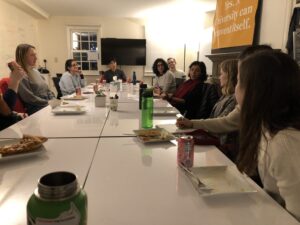Why Equity Needs Dignity with Professor Joshi (SFS)
By Shelby Gresch, SFS'22
 This past Wednesday, thirteen students took a break from their busy last week of classes to share a meal with Professor Shareen Joshi of the SFS at the last Red House Dinner Series event of this semester.
This past Wednesday, thirteen students took a break from their busy last week of classes to share a meal with Professor Shareen Joshi of the SFS at the last Red House Dinner Series event of this semester.
Professor Joshi grew up in India and moved alone to the United States at seventeen. Here, she attended Reed College and studied economics with the hope that someday it would lead her back to India. She wanted to answer a question that nawed at her then and still drives her work today: “Why is my country poor?” There was just one small problem: she hated economics.
This was not a feeling unique to Professor Joshi either. Students around the table nodded in agreement and shared exasperated smiles about the ‘torture’ that economics classes can inflict. As Joshi put it, economics “is not a warm and fuzzy welcoming field.” Yet despite the fact that she hated the ruthless culture of economics and flunked her qualifying exams when she went back to grad school, Joshi went on to earn her PhD in economics at Yale and then complete a postdoc at the University of Chicago. Why? As she sees it, the toolkit she built was worth the suffering, and now she can really focus on what she’s interested in.
Conventionally speaking, what Professor Joshi is interested in, is international development. And that’s what she teaches here at Georgetown. But in Joshi’s own words, “international development really isn’t a thing.” She shared with the students how she struggled with the concept of ‘development’ because it’s such a broad subject, and one prone to oversimplification and misunderstanding. “Every person who is on the ground starting a business, or just going about their life is contributing to development,” explained Joshi. In this way, she made students really think about what they considered to be international development and encouraged them to figure out what they could bring to the table. She emphasized that it’s not all about economics, and while economics is always a helpful background to have, students can contribute to the field in many ways – without suffering though years of production functions.
From there, students drove the conversation toward Joshi’s own experience and understanding of development in relation to our Dinner Series theme of advancing equity across disciplines. With the years of strict economics behind her, Joshi has recently focused her work on issues of resources in rural areas, women’s self-help groups in India, maternity policy, and the intersections of a variety of other social and demographic factors and economic development. Noting that Jesuit social thought had permeated her work, Joshi explained that a focus on equity is something she would like to see more of in the field of economics. She believes the first step is equating equity with dignity. By bringing the idea of basic human dignity into policy and economics, we could change the lenses with which we view some of the challenges of international development.
This gave everyone something to think about, and when Joshi turned the question back toward the students, asking what they thought was missing from the development and equity discussion, they had some ideas of their own. One student suggested that perhaps we are using the wrong metrics to measure development in the first place, another stressed the need for better institutions, and a third raised the question of whether development as a study is condescending. Joshi encouraged them all to keep asking these types of difficult questions and to refuse to accept an easy answer.
Stay tuned for more Dinner Series to come! Students can join the Red House Student Network listserv here to be the first to receive information about signups and stay up to date about all upcoming Red House events. You can also visit our Facebook page for event updates from the Red House.
If you are a faculty member who would like to share your work or join our conversations around contemporary issues in higher education, please email the Red House at redhouse@georgetown.edu



